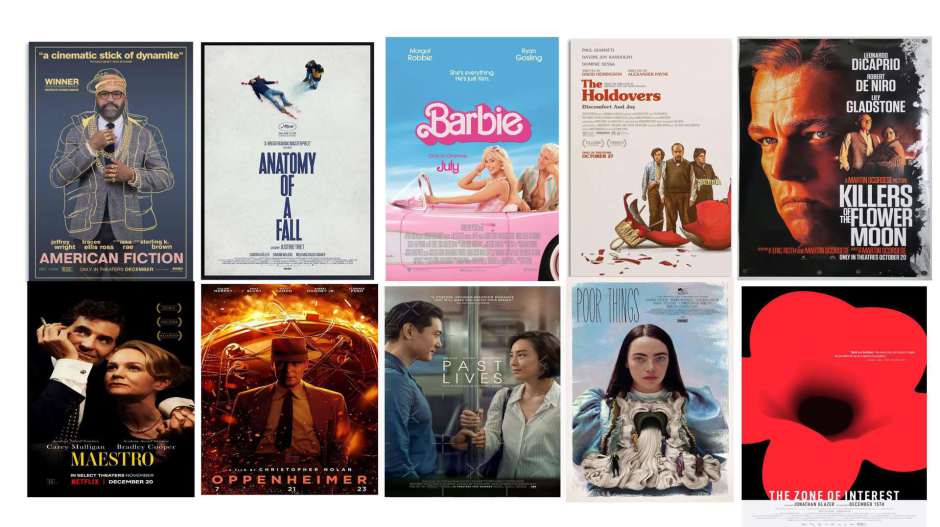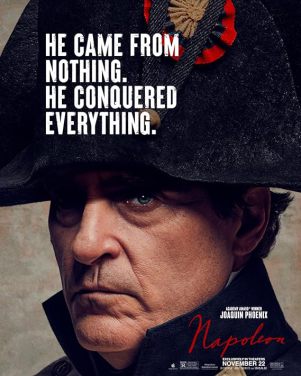JEANNE’S REVIEW
The greatly anticipated NAPOLEON is greatly disappointing. It is true that director Ridley Scott is a master at filming momentous battle scenes --- and in that arena NAPOLEON does not fail. As for documenting Napoleon Bonaparte’s (Joaquin Phoenix) relationship with his wife, Joséphine (Vanessa Kirby), Scott’s film imparts very little that is previously unknown.
Aided in his rise to power by his brother, Lucien Bonaparte (Matthew Needham), and a bizarre need to please his mother, Napoleon succeeds in strategy for winning conflicts where others have failed. And Scott’s choreography of his epic battlefield sequences, along with the brilliant cinematography from Dariusz Wolski, create action that is so intense, the audience feels as if they, too, are in the middle of these ghastly skirmishes.
But after the first major clash, and at a running time of two hours and 38 minutes, each additional invasion by Napoleon begins to feel like more of the same. These fights become more protracted and consequently less interesting.
Scott seems to revel in the chaos of battle. In scene after scene the audience is subjected to men and horses falling through the ice during one particular conflict. Yes, war is horrific, but these sequences could have been shortened --- and the violence less grotesque. One or two shots of men and their horses perishing in icy waters would have been sufficient --- the same depiction over and over is unnecessary.
Perhaps the most egregious mistake Scott makes is the casting of Kirby. There is simply no chemistry between her and Phoenix. What was purported to be one of the great love affairs of all time between Napoleon and his Joséphine is reduced to perfunctory sex scenes, repeated tiresome conversations about her inability to give him an heir and a decidedly unmoving scene detailing their divorce. Kirby tries to produce a tear or two over the proceedings, but with little success.
And Phoenix is all over the place with his portrayal. His Napoleon is mostly stoic --- and, at times, a bit like The Joker character he’s known for playing. Phoenix is at his best when he’s contemplating Napoleon’s next strategic move, definitely not when he’s trying to win over Joséphine’s affections. Phoenix is currently 49 years old. Napoleon was 35 when he was crowned emperor of France, which happens about halfway through Scott’s film. From the beginning, Phoenix comes off as too old to be cast as the French conqueror.
There is no doubt that NAPOLEON is a spectacle. The production designs by Arthur Max, costumes by David Crossman and Janty Yates, and set decorations by Celia Bobak and Elli Griff are divine. But these things alone do not produce a film too long in running time worth sitting through. David did manage to stay awake --- and actually enjoyed the extravaganza. I, on the other hand, couldn’t wait for it to end.
Opinion: Wait for VOD
DAVID’S REVIEW
As NAPOLEON begins, the audience watches intently as a disheveled Marie Antoinette walks slowly toward the guillotine to be beheaded. The raucous, angry crowd hurls rotten food and epithets at the corrupt and despised former queen. It’s a fascinating scene.
It's well known that Scott loves his battle scenes. Unfortunately, in NAPOLEON they are far too frequent and repetitive. It would have been easy to scale back the film’s 2:38 running time by shortening some of the battles.
Scott portrays most, if not all, of France’s historical periods following the French Revolution. The director must have felt it necessary to depict virtually all of Napoleon’s (Joaquin Phoenix) battles in vivid detail. But the details tend to be so similar we cannot tell the deadly skirmishes apart --- except for one in particular.
That distinctly horrible battle has Napoleon and his army perched atop a hill. As the enemy approaches, the soldiers begin losing their footing, because beneath them is a frozen lake. The savvy Napoleon orders cannonballs to be fired, causing fissures in the ice. The soldiers, along with their horses, fall into the icy waters and drown before what’s left of the opposing army retreats.
Scott’s film is certainly interesting from an historical perspective. He introduces the viewer to past French figures like Robespierre and Talleyrand, although Scott had an opportunity to go into more detail about their roles in French history but did not.
Much of NAPOLEON focuses on the relationship between Napoleon and his wife of many years, Joséphine (Vanessa Kirby). Some critics, including you-know-who, will say the duo lacked true chemistry, and I would have to agree. But the really blatant omission in the film is the dearth of information about Joséphine herself. Kirby does what she can with material written by David Scarpa. She is a fine actress who should have been given more to work with.
As for Phoenix, his acting is about what I expected in the title role. Napoleon was an egotistical, often maniacal individual, and Phoenix credibly portrays this part of his personality.
NAPOLEON is seamless from one encounter to another. The film tends to praise Napoleon as a master of strategy when it comes to winning wars. However, we learn at the movie’s end that he lost over three million soldiers over the course of his leadership, and for that, he was eventually exiled --- on two occasions. First there was the island of Elba, followed later by the island of St. Helena.
NAPOLEON is not perfect, but it manages to hold your interest, at least it did for me.
Opinion: Mild See It Now!


